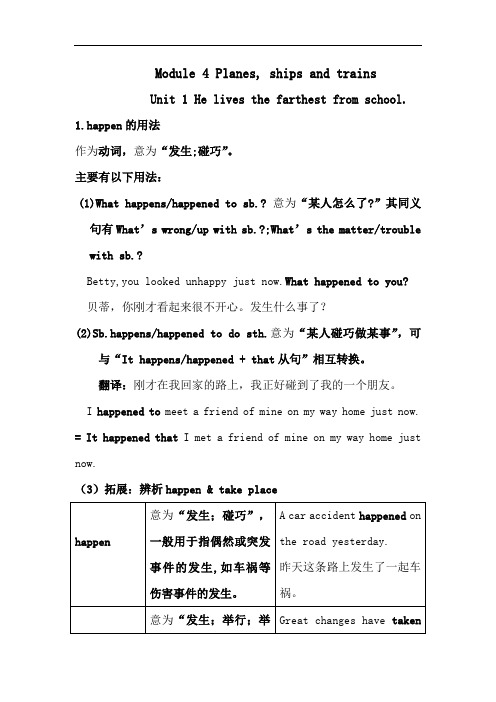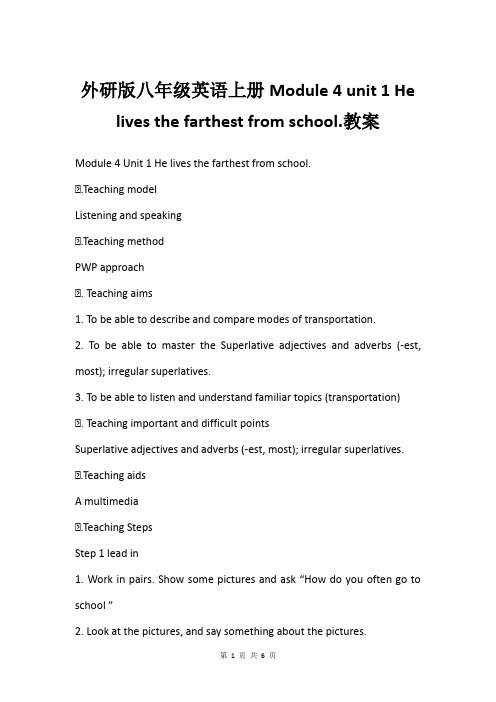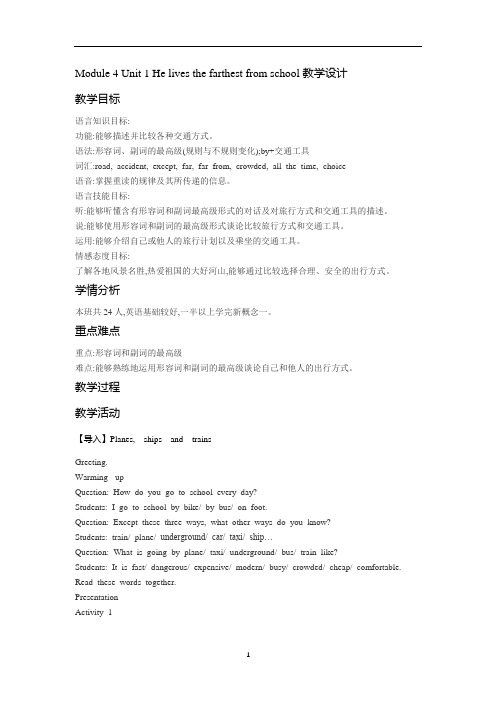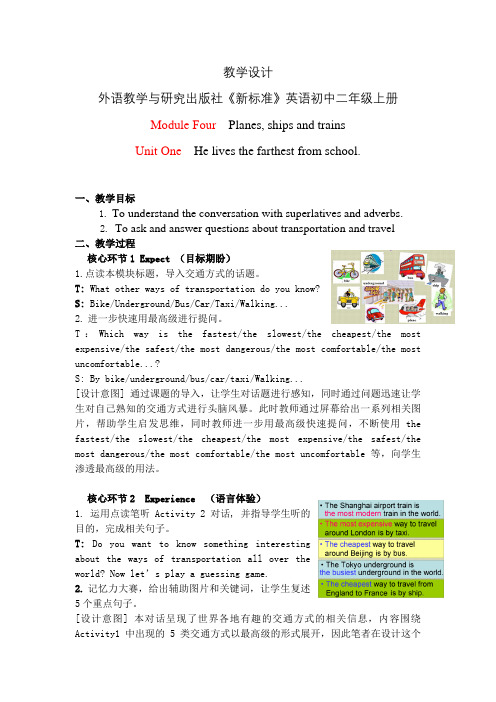2017外研版英语八年级上册Module 4 Unit 1《He lives the farthest from school》word导学案
外研版英语八年级上册 Module 4 Unit 1 教材重要知识点梳理

Module 4 Planes, ships and trainsUnit 1 He lives the farthest from school.1.happen的用法作为动词,意为“发生;碰巧”。
主要有以下用法:(1)What happens/happened to sb.? 意为“某人怎么了?”其同义句有What’s wrong/up with sb.?;What’s the matter/trouble with sb.?Betty,you looked unhappy just now.What happened to you?贝蒂,你刚才看起来很不开心。
发生什么事了?(2)Sb.happens/happened to do sth.意为“某人碰巧做某事”,可与“It happens/happened + that从句”相互转换。
翻译:刚才在我回家的路上,我正好碰到了我的一个朋友。
I happened to meet a friend of mine on my way home just now. = It happened that I met a friend of mine on my way home just now.(3)拓展:辨析happen & take place2.accident的用法(1)作为可数名词,意为“交通事故;意外事件”。
A car accident happened to the old granny a moment ago.就在不久前,那位老奶奶遭遇了车祸。
(2)常见固定搭配:① traffic accident “交通事故”Every year many traffic accidents happen because the drivers drive so carelessly.每年由于驾驶人开车太过于粗心,导致了很多交通事故的发生。
外研版八年级英语上册Module 4 unit1 He lives the farthest from school.教案 (1)

课标分析:新课程标准将英语课程的语言技能目标设为九个分级标准,八年级的学生应该达到四级到五级的基本要求,其中,对听说技能的描述如下:能听懂接近自然语速、熟悉话题的谈话,并能从中获取主要信息和观点,能根据语调和重音理解说话者的意图;能就简单的话题提供信息,表达简单的观点和意见,参与讨论。
今天,我依据课标的相关要求,就此课题进行了不同的教学思考和设计,以不同方式实践着课标的相关内容。
本课以means of transportation为中心话题,围绕各种交通方式的对比和选择展开,主要在听说活动中引领学生学习形容词的最高级,以及使用形容的最高级对比和选择交通方式,同时在此话题下引导学生学习和使用本课时所需要词汇。
本课时内容与学生们的实际生活息息相关,易于引发学生用英语进行交流。
在语言学习的活动中提高他们的英语听说能力。
同时依据《课程标准》在教学设计中渗透了语音教学、听力策略的指导以及情感态度的提升活动环节,对有效的学习策略有利于提高学习效率和发展自主学习能力;积极的情感态度有利于促进主动学习和持续发展。
教材分析:此次视频展示课的课时为外研版八年级上册,Module 4 Planes, trains and ships Unit 1 He lives the farthest from school. 课型为听说课,我依据英语课程标准对此教材和本单元进行了深入的理解与分析。
新课程标准将英语课程的语言技能目标设为九个分级标准,八年级的学生应该达到四级到五级的基本要求,其中,对听说技能的描述如下:能听懂接近自然语速、熟悉话题的谈话,并能从中获取主要信息和观点,能根据语调和重音理解说话者的意图;能就简单的话题提供信息,表达简单的观点和意见,参与讨论。
我和我们备课组几位优秀的教师一起依据课标的相关要求,就此课题进行了不同的教学思考和设计,以不同方式实践着课标的相关内容。
本课以means of transportation为中心话题,围绕各种交通方式的对比和选择展开,主要在听说活动中引领学生学习形容词的最高级,以及使用形容的最高级对比和选择交通方式,同时在此话题下引导学生学习和使用本课时所需要词汇。
外研版八年级上册Module 4 Unit 1 he lives the farthest from school

¥50 ¥500 ¥3,506
2. (cheap)
— Which one is the ___c_h_e_a_p_e_s_t____?
— The clock.
3. (popular)
— Which subject is the
_m__o_s_t_p_o_p_u_l_a_r with the
Going by train is Cheaper .
Going by bike the cheapest
is
.
Complete the sentences with the correct form of the words .
Tom
Jack
Mike
1. (fast)
— Who runs the__fa__s_te_s_t___ of the
Unit 1 He lives the farthest from school.
What ways can you travel?
bike
bus
taxi plane
underground subwa
train ship
P26 1 Match the words in the box with the pictures.
How do you go to school? Why?
How does your father go to work? Why?
My friend x x usually goes to school by _____, because it’s ________.
His/Her father…….because it’s……,
外研版八年级英语上册Module 4 unit1 He lives the farthest from school.教案

walk by bus by bike by underground
Betty
Tony
Lingling
Daming
Ways to go to school
.Listen again and check the true sentences.
C.Shanghai-Beijing train
5.A.By busB. By ship C.By underground
.Listen and answer the question.
1.How many people are Betty and her mum talking about in the conversation? Who are they?
4.Read and complete the passage.
vedio
1.Put the students in groups of 3-4 to talk about problems travelling to school.
2.Play the recording. Ask the students to find out the problems and different ways of travelling to school talked about in the conversation.
tape
1.Read through the list of words and ask the students to repeat them after you.Make sure they understand them all.
外研版八年级英语上册Module4Unit1Helivesthefarthestfromschool教案

Helivesthefarthestfromschool教学目标1.Words:road,accident,except,choice,classmate,far,farfrom,close,crowed,all thetime.2.Tounderstandconversationsabouttripsandtransports.3.Totalkabouttheyhowtogotoschooleveryday.教学重点Keystructures:Whathappened?Don’tworry.MaybeIshouldgotoschoolbytaxi.It’sthemostcomfortableway,butit’salsothemostexpensive.教学难点Totalkaboutwholivesthefarthest/closestintheirclass.学情分析Manystudentsgotoschoolbybus,soIthinktalkaboutthistopiciseasyand familiarto them.学法指导(1)Toteachyourselves(2)Tohelpeachother(3)Topractiseinpairsandgroups教学过程教学内容教师活动学生活动效果预测(可能出现的问题补救措施修改意见)一Module4Planes,sh ipsandtrains. Unit1Helivesthef arthestfromschoo l.二.Activity1三.Activity2四Activity3五Activity六Activity5七Activity6 Step1Warming-upReviewthewordsoftransportation.Step2.workinpairs.Howdoyouoftengotoschool?Step3.Matchthewordsintheboxwiththepictures.Step4.ListenandmatchthewordsintheboxwiththepicturesinActivity1Step5.ListenandreadStep6.Readandfindouttherightanswers.pletethesentenceswi1.Lookandsay.2.LookatthepicturesandsaytheEnglishwords.e.g.bus-bybus/train–bytrain/…3Askandanswer.4.Writethewordsnexttothepictures.5Readthesewordstogether.6.Matchthewordswithpicturesaccordingtothelistening.7.Lookat thepi ctures,andsaysomethingaboutthepictures.8.Studentscompletethetableaccord八Activity7 ththecorrectformofthewordsinthebox.Step8Completethesentenceswiththewordsorexpressioninthebox.Step9PronunciationandspeakingStep10Workinpairs.-What’sthemostexpensivewaytogotoschool?-Goingbytaxiisthemostexpensive.…ingtothelistening.9.Checkanswersintheirgroups.10.Readthepassageandfindouttheright.11.Checkintheirgroups12.Checkanswersinthewholeclass.13.Doitbythemselves.14.Checkintheirgroups.15.Filltherightwordsintheblanks.16.Listentothetapefirst17.Underlinethewordsthespeakerstresses.18.Workinpairs.Listenagainandrepeat.18.Readthe wordstogether,andansw erquestionsaboutthewaysofgoingto school.板书设计Unit1Helivesthefarthestfromschool.-Howdoyougotoschool?-Wholivesthefarthestfromschool?-Igotoschoolbybus/bike/…-Linglinglivesthefarthestfromschool.参考书目及推荐资料《英语八年级上册》教材、《教师用书》教学反思本堂课依据教材的编排内容和听说课型特点进行课堂教学设计,突出重难点。
外研版八年级英语上册Module 4 unit 1 He lives the farthest fr

外研版八年级英语上册Module 4 unit 1 He lives the farthest from school.教案Module 4 Unit 1 He lives the farthest from school.Ⅰ.Teaching modelListening and speakingⅠ.Teaching methodPWP approachⅠ. Teaching aims1. To be able to describe and compare modes of transportation.2. To be able to master the Superlative adjectives and adverbs (-est, most); irregular superlatives.3. To be able to listen and understand familiar topics (transportation)Ⅰ. Teaching important and difficult pointsSuperlative adjectives and adverbs (-est, most); irregular superlatives.Ⅰ.Teaching aidsA multimediaⅠ.Teaching StepsStep 1 lead in1. Work in pairs. Show some pictures and ask “How do you often go to school ”2. Look at the pictures, and say something about the pictures.3. Introduce the new words.4. Learn the new words.5. Read the new words.Step 2 presentation and practice1. Ask the students to read the words in Activity 1.bus ship taxi train underground2. Look at the pictures in Activity 1 carefully.3. Now match the words with the pictures.5. Ask the students to check their answer with a partner.6. Call back the answer from the whole class and check the answer.Step 3 pre-listening1. Ask the students to read the words in Activity2.busy cheap expensive modern2. Play the recording and ask the students to listen to the recording carefully.3. Listen and match the words in the box with the pictures in Activity 1. You need to use one word more than once.4. Ask the students to check their answer with a partner.5. Call back the answer from the whole class and check the answer.Step 4 Listening and reading1. Show some pictures, and ask the students to talk about them.2. Ask the students to read the conversation silently.3. Play the recording and ask the students to listen and read the conversation.4. Read the conversation.5. Act it out.6. Learn “Everyday English”1) What happened2) Don’t worry.Step 5 Reading practice1. Ask the students to read the conversation again.2. Now complete the table.Betty Tony Lingling DamingWays to go to school3. Ask the students to check with a partner.4. Check the answers:Step 6 practice1. Ask the students to read the words in the box in Activity 4.close comfortable good far2. Read through the sentences.1) Lingling lives the ________ to school, so she always walks.2) The _________ way to go to school is by taxi.3) Tony lives the ___________ from school.4) For Betty, going to school by bike is the _________ choice.3. Complete the sentences with the correct words from the box.4. Ask the students to check with a partner.5. Check the answers:Step 7 Complete the sentences.1. Ask the students to read the words or expression in the box in Activity 5.crowded except modern road accident2. Read through the sentences.1) All the students take the bus to school ___________ Sam.2) The ___________ train in the world is the Shanghai airport train.3) I saw a(n) __________ on the way to school yesterday.4) I do not take the bus to school because it is usually very ___________.3. Complete the sentences with the correct words from the box.4. Ask the students to check with a partner.5. Check the answers:Step 8 speaking1. Play the recording once without stopping.2. Play the recording again and ask the whole class to repeat.1) —Who lives the closest to school— Lingling lives closest.2) — Whah is the most comfortable way to go to school for Betty— By taxi.3. Ask the students to listen and mark the intonation.4. Now listen again and repeat.Step 9 speaking practice1. Ask the students to read the words or expression in the box in Activity 7.2. Read through the example with the class.— What’s the most expensive way to go to school— Going by taxi is the most expensive.3. Work in pairs.Step 10 Important and difficult points1. Maybe I should go to school by taxi. 或许我应该坐出租车去上学。
外研版八年级英语上册 Module 4 Unit 1 He lives the farthest from school教学设计

Module 4 Unit 1 He lives the farthest from school教学设计教学目标语言知识目标:功能:能够描述并比较各种交通方式。
语法:形容词、副词的最高级(规则与不规则变化);by+交通工具词汇:road, accident, except, far, far from, crowded, all the time, choice语音:掌握重读的规律及其所传递的信息。
语言技能目标:听:能够听懂含有形容词和副词最高级形式的对话及对旅行方式和交通工具的描述。
说:能够使用形容词和副词的最高级形式谈论比较旅行方式和交通工具。
运用:能够介绍自己或他人的旅行计划以及乘坐的交通工具。
情感态度目标:了解各地风景名胜,热爱祖国的大好河山,能够通过比较选择合理、安全的出行方式。
学情分析本班共24人,英语基础较好,一半以上学完新概念一。
重点难点重点:形容词和副词的最高级难点:能够熟练地运用形容词和副词的最高级谈论自己和他人的出行方式。
教学过程教学活动【导入】Planes,ships and trainsGreeting.Warming- upQuestion: How do you go to school every day?Students: I go to school by bike/ by bus/ on foot.Question: Except these three ways, what other ways do you know?Students: train/ plane/ underground/ car/ taxi/ ship…Question: What is going by plane/ taxi/ underground/ bus/ train like?Students: It is fast/ dangerous/ expensive/ modern/ busy/ crowded/ cheap/ comfortable. Read these words together.PresentationActivity 1In our book, there are also some pictures of the ways of going, let’s have a look togethe r.Question: What’s this?Students: Train/ bus …Activity 2Listen and match the words with the pictures.Check the answers together.Listen again and match the phrases together, and pay attention to the whole sentence. Check the answers one by one.Read the sentences together.Activity 3Betty took the bus to school today, but she was late. And now she is talking about some thing with her mum, let’s listen and try to find out what they are talking about.Listen and answer 3 questions.Question 1: What are they talking about?Question 2: Who lives the farthest from school?Question 3: Finally, how does Betty go to school?Listen again and complete the table.WhyWhat’s it like?By bikeQuestion: How does Tony go to school and why?Question: What is going by underground like?Question: How about Lingling?/ Why?/ What is going on foot like?Question: How about Daming?/ What is going by bus likeTeacher: There is still another way of going in our dialogue, remember? What is that? Students: By taxi.Teacher: What is it like?Students: It is the most comfortable way, but it’s also the most expensive.Teacher: After comparing so many ways, finally, Betty decides to go to school by …Wha t is it like?Students: Bike, dangerous.Teacher: so in the end, what does her mum say?Students: Remember to be careful all the time.Teacher: Excellent! How does her mum feel?Students: worried!Teacher: Yes, her mum is worried about Betty, so are your parents. When you go out or when you go to school, your parents must be very worried about you too. So what shoul d you do?Students: Remember to be careful all the time!Read after the radio. Pay attention to you intonation.Practice reading or retelling in pairs.Check reading or retelling, and try to act it out. (6组)ConsolidationWork in groupsLeading- inWe all know that the National Day is coming, do you have some plans of travelling? So me students say yes, but some say no.T: Hello, Zhao Rui, do you have some plans during the National Day?S:No, I don’t.T: Really? How about going to the Labor Park with me?S: Er… That’s a good idea! How are you going there?T: I’m going there by underground, because it is the fastest way and it’s also the most c omfortable. How about you?S: I don’t like going there by underground, because it is the most boring way. I am goin g there on foot, because my home is the closest to it, and it is also the most relaxing an d the most interesting way. I can also have a lot of fun on my way there.T: Yes, you are right! I will go there on foot, too. See you then.S: Bye-bye!Make it clear.Make an interview: about the ways to go there.1 reporter3 studentsSomewhere togetherBy bus/ bike/ car/ plane/ ship/ coach/ underground…Superlative adjectivesSee? Work in groups. Suppose you are going somewhere together, but you have different ideas about the ways to go there. Of course you should tell us why, just like what Zhao Rui and I did just now. And try to use superlative adjectives and adverbs here. Four stud ents work in a group, and one student is the reporter. He or she is making an interview with the other three students about the ways to go there. Understand? Let’s do it togethe r!Practise in groups3 groups act their dialogue out at the front.More exercises about the superlative adjectives and adverbs.Do it together and one student come the blackboard.Check the answers one by one by reading it aloud.Read the sentences together and pay attention to the superlative adjectives and adverbs. SummaryWatch the video.HomeworkA+B or A+C, it is up to you!Thank you!。
外研版八年级英语上册教案:Module4Unit 1 He lives the farthest from school

教学设计外语教学与研究出版社《新标准》英语初中二年级上册Module Four Planes, ships and trainsUnit One He lives the farthest from school.一、教学目标1.To understand the conversation with superlatives and adverbs.2. To ask and answer questions about transportation and travel二、教学过程核心环节1 Expect (目标期盼)1.点读本模块标题,导入交通方式的话题。
T: What other ways of transportation do you know?S: Bike/Underground/Bus/Car/Taxi/Walking...2.进一步快速用最高级进行提问。
T:Which way is the fastest/the slowest/the cheapest/the most expensive/the safest/the most dangerous/the most comfortable/the most uncomfortable...?S: By bike/underground/bus/car/taxi/Walking...[设计意图] 通过课题的导入,让学生对话题进行感知,同时通过问题迅速让学生对自己熟知的交通方式进行头脑风暴。
此时教师通过屏幕给出一系列相关图片,帮助学生启发思维,同时教师进一步用最高级快速提问,不断使用the fastest/the slowest/the cheapest/the most expensive/the safest/the most dangerous/the most comfortable/the most uncomfortable等,向学生渗透最高级的用法。
- 1、下载文档前请自行甄别文档内容的完整性,平台不提供额外的编辑、内容补充、找答案等附加服务。
- 2、"仅部分预览"的文档,不可在线预览部分如存在完整性等问题,可反馈申请退款(可完整预览的文档不适用该条件!)。
- 3、如文档侵犯您的权益,请联系客服反馈,我们会尽快为您处理(人工客服工作时间:9:00-18:30)。
Module 4 Planes, ships and trainsUnit 1 He lives the farthest from school.第一课时一、学习目标:1. 初步掌握本课重点词汇和句型2. 初步理解课文内容,提高有关交通方式的听说技能3. 初步理解形容词、副词最高级的构成和用法二、学习重点:听懂有关形容词、副词最高级的对话,并采用它们进行简单对话三、学习难点:掌握形容词、副词最高级的用法课前预习一、使用说明与学法指导:1. 朗读并识记单词表中本课新词汇,不会读的用红笔标记2. 试读听力部分的单词及课文对话,初步理解对话,不会读或不能理解的用红笔标记二、教材助读:1. 朗读并识记听力部分的单词并根据活动预测听力内容,为听力扫除障碍2. 仔细预习课本语法部分关于本模块的语法知识,朗读并理解课文对话,找出对话中出现的形容词、副词最高级并注意拼读:far –farthest____________________________________________________________________________________________________________________________________________________________________________________________________________________________ 三、预习自测(一) 用英语读出并写出下列单词、短语及句子1. 路2. 交通事故3. 除…之外4. 选择5. 拥挤的6. 远,遥远7. 近的 8. 做某事迟到 ]9. 乘出租车 10. 最舒服的方式11. 骑自行车 12. 有点13. 大多数的 14. 小心,当心15. 和…一样 16. 远离……,离……远的17. 一直 18. 堵塞的交通(二) 写出下列形容词的汉语意思并写出他们各自比较级和最高级far heavyclose safeslow comfortable expensive dangerouscareful四、我的疑问:__________________________________________________________________________________________________________________________________________________________课内探究一、情景导入:Talk: How many ways of transport (交通) do you know? What are they?Which one is your favourite?二、洗耳运动完成听力部分三、逐步完成Listen and read及后面的练习四、质疑探究自读课文,并能翻译、背诵、默写下列重点句型。
1.What happened?2.Maybe I should go to school by taxi.3.It’s the most comfortable way, but it’s also the most expensive.4.Then what about going by bike? That’s a good choice.5.Don’t worry. I’ll be careful!6.He lives the farthest from school.[五、当堂检测Work in groups. Make dialogues talking about your favourite way of transport. 六、课后反思_____________________________________________________________________________ _____________________________________________________________________________课后训练一、写出下列形容词和副词的比较级和最高级1. t all2. long3. short4. large5. close6. late7. big 8. hot 9. busy10. easy 11. comfortable12. expensive 13. dangerous二、单项选择( ) 1. I want to go to Beijing _______ because I can see the beautiful scenery all the way.A. by a trainB. take a trainC. on trainD. by train ( ) 2. Traveling by plane is the most comfortable, but it is also the _________.A. expensiveB. most expensiveC. cheapD. cheapest ( ) 3. My uncle lives ________ his factory, so he goes to work by train.A. farB. far fromC. closeD. close to ( ) 4. Everybody is here ________ Tom , because he is ill in hospital .A. exceptB. besidesC. except thatD. beside ( ) 5. --- I can’t carry the box , Mum .--- _________, I can help you.A. OKB. Don’t worryC. That’s all rightD. you’re welcome课后学习指导:朗读对话注意语音语调,并注意形容词、副词最高级的拼读Unit 1 He lives the farthest from school. 第二课时一、学习目标:1. 熟练掌握本课重点词汇句型,并能准确、熟练写出所学形容词、副词的最高级2. 能听懂和理解有关不同交通方式的话题,培养听说技能3. 能用形容词、副词最高级进行有关描述自己喜欢的交通方式的简短对话二、学习重点:掌握形容词、副词最高级的用法三、学习难点:通过对话学会采用形容词、副词最高级描述自己喜欢的交通方式课前预习一、使用说明与学法指导:1. 通过语音训练拓展日常交际用语2. 通过对话表演方式大胆开口,能用英语进行有关交通方式的交流3、观察对话总结形容词、副词最高级的变化规则二、教材助读:朗读并理解语音部分的词句,注意结对反复练习句子重读三、预习自测(一) 小组合作练习Activity 6中的重读单词,相互纠正(二) 结对练习Activity 7部分,注意结合Activity 6的知识读出句子重读部分四、我的疑问:_____________________________________________________________________________ _____________________________________________________________________________课内探究一、情景导入Work in pairs. Talk about different ways of transport.二、按要求完成语音部分注意英语口语中的重读现象三、质疑探究知识要点探究1. What happened? 发生什么事了?happen动词,“发生”,强调偶然性;常常与之相区别的是take place,也表示“发生”,但强调计划性。
happen与take place的主语都只能是事情,不能是人,若要表达“某人发生了某事”则使用短语“sth. happen to sb.”牛刀小试:选词填空,注意单词形式happen / happen to / take placeThe accident ________________ at about twelve o’clock last night.The school sports meeti ng __________________ in April every year.What ____________________ the old man?2. Nobody was late, except me. 除了我,没有人迟到。
except介词,“除……之外”,不包含所除去的对象,常常强调整体与部分的关系;与之相区别的短语 as well as有时也被翻译为“除了……(还有);以及”,是包含了所罗列的对象的,起连接作用,注意区别。
牛刀小试:选词填空并翻译成汉语:except / as well asI like all kinds of sports, ________________ running.He gave me lots of clothes ________________ much food.Everybody is here, _________________ Li Min.Daming, as well as Betty, went for a walk with me.3. It’s a bit dangerous. 这有点危险。
a bit“一点,有点”,在此句中修饰形容词dangerous,相当于a little。
拓展:注意a bit 与a little的联系与区别:修饰形容词、副词:a little + adj. / adv.原级/比较级 = a bit + adj. / adv.原级/比较级修饰名词:a little + 不可数名词 = a bit of + 不可数名词牛刀小试:Could you please speak _________________ more loudly? I can’t hear you.请你说大声一点好吗?我听不见你说话。
I need ___________________ time to finish it.我需要一点点时间完成。
4. He lives the farthest from school, so he takes the underground.他住得离学校最远,所以乘地铁。
Her home is the closest to school, so she walks.她家离学校最近,所以步行。
